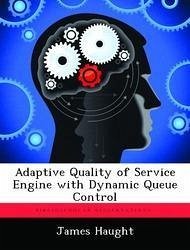While the current routing and congestion control algorithms in use today are often sufficient for networks with relatively static topology, these algorithms may not be sufficient for military networks where a certain level of quality of service (QoS) needs to be achieved to complete a mission. Current networking technology limits a network's ability to adapt to changes and interactions in the network, often resulting in sub-optimal performance. This research investigates the use of queue size predictions to create a network controller to optimize computer networks. These queue size predictions are made possible through the use of Kalman filters to detect network congestion. The premise is that intelligent agents can use such predictions to form context-aware, cognitive processes for managing communication in mobile networks. The network controller designed and implement in this thesis will take in the current and predicted network conditions and make intelligent choices to optimize the network.
Hinweis: Dieser Artikel kann nur an eine deutsche Lieferadresse ausgeliefert werden.
Hinweis: Dieser Artikel kann nur an eine deutsche Lieferadresse ausgeliefert werden.








